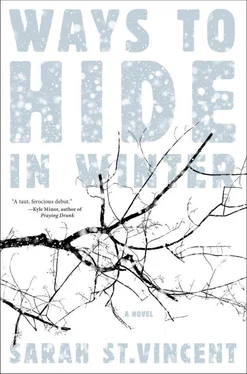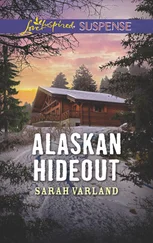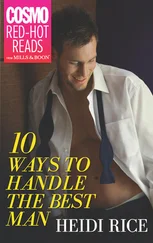The next morning, the telephone in the store rang.
The dawn had brought a clear day, the light extending its first fingers through the windows of my grandmother’s house as I’d roamed through it, quietly stuffing clothes into plastic bags, making the bed, putting away the dishes. The gravel had crunched under my feet as I’d walked to the mailbox, the sun illuminating the red flag that stood proudly above it. Reaching into the box, I’d pulled out a pile of bills and junk mail. Perhaps superstitiously, I had thought there might be a letter from my brother, but there wasn’t.
Back in the house, I’d placed the bills on the table, unopened. Then I had left, turning a key in the front door that, in my lifetime, had never been locked.
I was calm, much more so than I’d expected to be. Returning from the hostel to my grandmother’s house very early that morning, watching the headlights pass over fields that were otherwise swathed in darkness, I hadn’t known what to think—about the stranger, about any of it. In some ways, I didn’t want to think about what had just happened at all—the way his face had looked when I’d reappeared; the drawn curtains in the upstairs room; the silence; the way he’d run his hand over my skin, the smooth places and the scars. It was something too strange, too enormous to be looked at. So I didn’t. I put it away in the back of my mind, like a mysterious object I’d found in the street, to be taken out and considered later.
Thankfully, no one had been waiting for me at the store; it was still early. Shouldering my purse, I’d pushed my way inside, turning on the lights. I still had enough cash for another two or three tanks of gas, a bit more for a sandwich here or there. I didn’t think about what would happen after that.
The sound of the telephone tore through the air like an electric shock.
I stared at the receiver on the wall next to the ice cream case. How long had it been working? Why hadn’t anyone told me?
“Hello?” I said uncertainly.
“Kath, it’s Martin.” He sounded breathless. “Could you come up here for a minute?”
I hung up and hurried out, letting the door slap shut behind me.
Martin was standing behind the front desk, face devoid of expression, back hunched like a question mark. With him were two police officers I didn’t recognize, both men.
“Is this her?” one of them asked Martin. He had sandy hair and tanned, smooth features, like a high-school track coach. Martin, by contrast, looked haggard and shriveled. There was a hammer on the desk, and he was turning a long, shining nail over in his hands, not looking up.
“What do you want?” I asked, with a feeling of deep dread.
“We just took your friend into custody,” the other officer said.
I looked from them to Martin, who looked back at me, his face empty and devastated. The room seemed to close in on itself, the air suddenly cold.
“My friend?” I forced myself to say, my voice sounding flat and far away.
“Come on, don’t play dumb,” the sandy-haired one said. “The foreigner.”
I glanced from one of them to the other, struggling to hide my shock.
“We’re aware of your relationship with the minister,” the same cop went on. “We’d like to ask you a few questions about him, if that’s all right.”
It took me a moment to absorb the words.
“The minister?” I echoed, confused. Martin lowered his head again.
“We’d like to ask you a few questions,” the sandy-haired one repeated.
“No, I don’t think so.” I took a step back. “I don’t even know who you’re talking about. I don’t know any minister.”
“I’m talking about your friend,” he said patiently, as if talking to a small child. “The, uh…” He pulled a leather-bound notepad from his pocket and consulted it. “The Deputy Minister of the Interior, or whatever he is. We picked him up here about half an hour ago. Somebody called in with an anonymous tip this morning. Seems he’s been hiding out here for a while.”
“He’s in a whole lot of trouble,” the other cop said. His trooper’s hat was pulled low over his eyes; I couldn’t see his face clearly, although it looked round and pink. “They’ve called the FBI in for this one,” he went on. “They’ve called in the State Department. Our phone’s been ringing off the hook all morning. People from Washington. Whoever this guy is, he’s somebody’s big catch, that’s for sure. And that’s not gonna make things any easier for you if you decide you don’t feel like cooperating.”
My legs began to bend under me, although I managed to step sideways and sit in one of the chairs that were pushed against the wall. “I still don’t know what you’re talking about. Deputy minister? What is this?”
“This guy, lady.” The same cop, the one with the face like an Easter ham, reached into an envelope and held out a photocopy. The black-and-white picture showed a serious, thin-lipped man with a puffy face and neatly trimmed hair, staring straight at the camera with long, narrow eyes. He wore a suit and tie, and was holding a briefcase in one hand, a sheet of paper in the other. There were tables in the background, a patterned carpet, as if he were in some sort of fancy restaurant or ballroom. A shining clip held his tie in place over his rounded stomach.
“I don’t know who that is,” I told them, pushing the photocopy away.
“Look again.” The cop held it out in front of me. “He looks different now. He’s obviously lost a lot of weight. But you know him. He’s been here for months.”
“I don’t know who that is,” I said again. “I’m not lying.”
“That man is responsible for a lot of things, ma’am. At least that’s what we’re told. He ran the detention centers in Uzbekistan. He oversaw—”
I rose to my feet, bracing myself against the wall.
“You don’t know what you’re talking about,” I said harshly. “And frankly, I don’t either.”
“Come on, don’t bullshit us,” the Easter-ham cop said.
I rounded on him. “You don’t know the first thing,” I said, my voice forceful. “You don’t even know where Uzbekistan is. I’d bet money on it.”
They looked at one another.
“I’ll be in my store,” I said. “If you want to talk to me, bring me a piece of paper that says I have to.”
Without looking at Martin, I left and walked briskly back down the hill. Inside the store, I locked and bolted the door, closed the shutters, and sat down on the stool. My fingers pressed to my lips, I kept still.
The hours passed. Someone knocked, hesitant and hopeful-sounding, before giving up and going away. I stayed where I was, watching the squares of light from the windows as they crept across the floor, leaning and elongating as the sun moved west.
After a long time, the knob twisted, and I heard Martin calling.
“Kathleen,” he said.
I remained motionless.
“Come on,” he urged, more loudly this time. “Don’t scare me. I know you wouldn’t do that to me. Open up.”
Slowly, I slid one leg to the floor, then the other.
I thought he might have given up by the time I appeared, but he was still there.
“Come on,” he said. “Come out here with me. It’s better than sitting alone in the dark.”
I gave in. He sat on the bench on the porch, and after a moment, I lowered myself next to him.
The minutes passed.
“Do you think it’s true?” he said, just when I’d decided neither of us was going to say anything, that we were going to just sit there forever.
“Do I think what’s true?”
“This deputy minister stuff.”
I looked away. “It doesn’t matter.”
He kept his eyes on me for a long moment.
Читать дальше












